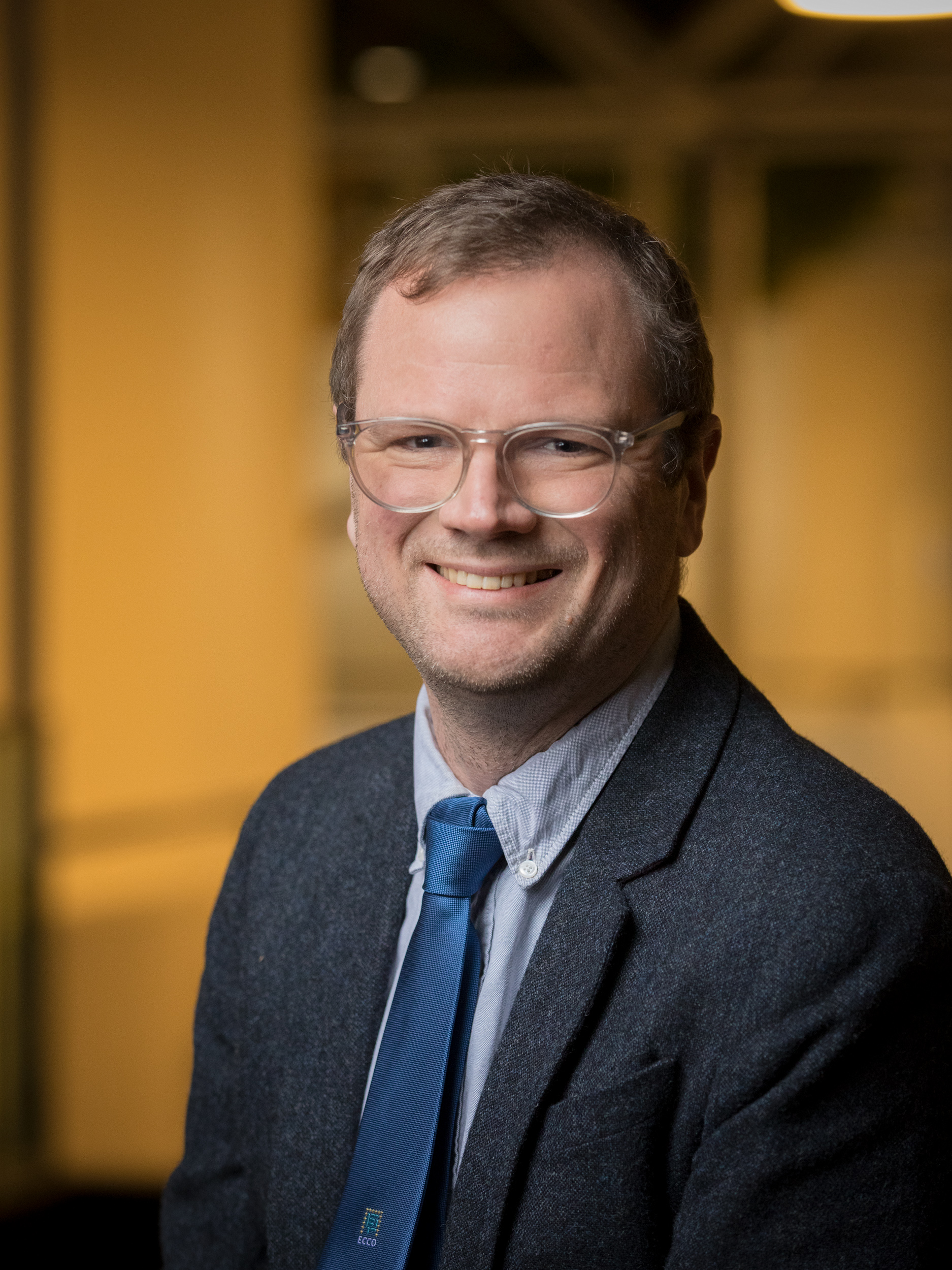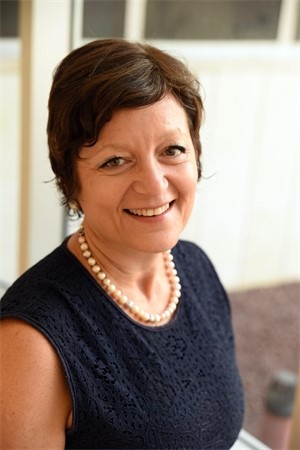Y-ECCO Interview Corner: Iris Dotan
Robin Dart, Y-ECCO Member
 Robin Dart Robin Dart© ECCO |
Iris Dotan is a gastroenterologist and mucosal immunologist based at Rabin Medical Center, Israel. She is chair of the International Organization for the Study of Inflammatory Bowel Disease (IOIBD) and is well known to ECCO Members through her previous membership of SciCom, her speeches at ECCO Congress and her permanent presence on the Hearts and Minds dancefloor. During a break at the ECCO Congress in Copenhagen, I sat down with Iris to discuss her career, how mentorship has been important to her and, for anyone who has been on a Zoom call with her in the last 3 years, the origins of the beautiful painting she is usually seen sitting in front of.
To start off, did you ever consider anything other than medicine as a career?
So for medicine, I never had a differential diagnosis…. At a certain point as a teenager I became interested in the mystery of the human mind and physiology. For some reason I assumed that neurosurgeons resolve these mysteries, so I wanted to become one. From then on it was clear to me that I was going to medical school and I didn't consider anything else. You always have to have a plan B, because of course you might not get accepted for medical school, especially in Israel, where it's very competitive, but actually I didn't.
After being an internal medicine doctor, I subspecialised in Gastroenterology. I immediately thought of Inflammatory Bowel Diseases as a focus because that was a field where, unfortunately, there were still a lot of unresolved problems and unmet needs. I was fascinated by the combination of interesting clinical questions and the possibility of investigating them myself, for instance by doing an endoscopy, and the close, long-term interaction with patients. I also thought that there would be a place to evolve in that field, specifically through the opportunity to do research in the laboratory and to be able to look at the disease from multiple perspectives.
|
|
As many readers will be aware, you are very active in research. How does this fit in with your day to day?
Being active in research is my passion. Being trained in mucosal immunology, I can move from clinical research to performing basic science, and can translate findings from the laboratory to clinical work. That is an advantage also for my centre, where clinicians and basic scientists from multiple disciplines interact and collaborate in a translational approach. Fitting research into daily routine is challenging. I see patients in the clinic, I scope them and as a division chief I take care of the division’s responsibilities. This doesn’t leave much time: we do not have reserved time for research, so I usually do the research in the afternoon and evening hours. The multidisciplinary team of great physicians and researchers in our centre is a privilege, as research responsibilities are shared and advanced even when my availability is more limited.
Did you always know you wanted to do research?
This has actually been a process. As I became a gastroenterologist focusing on Inflammatory Bowel Disease, I realised that research was a critical part of that field. Furthermore, I believed that my commitment to patients is not only to prescribe medicine and address clinical problems, but to understand why a medicine is working, what drives intestinal inflammation and how I can improve patients’ situations. Such questions and others could only be resolved by doing research.
I went to the immunobiology centre in Mount Sinai, New York, USA for a postdoc fellowship supervised by Professor Lloyd Mayer. That was both a career- and life-changing event. Mucosal immunology was a relatively new science, and there was so much excitement and interest in intestinal inflammation, as the intestines are a major site where mucosal surfaces are exposed to the outer world. The laboratory was unique in focusing on human intestinal epithelial cells and on translational research. Realising the importance and advantages of this approach, since then I have been a translational scientist by heart.
Many people I speak to tell me how important an influence Lloyd Mayer has been on their career, and his impact on IBD and IBD physicians lives on. You have written about mentorship previously. What does mentorship mean for you?
When Johan Burisch (past Y-ECCO Chair) was still a Y-ECCO Member we wrote an article about what makes a good mentor (UEG Journal 2016). His mentor (Pia Munkholm) and mine (Lloyd) inspired our writing, being a prototype of what (we believe) a mentor is, and should be. Mentorship to me is about having values that I sympathise with, and want to adopt; it is about a professional level, qualities and skills that I appreciate and try to acquire and it is about a generous and supportive approach towards more junior faculty, specifically the mentees. Having such a model, for me the team, and specifically mentees and junior faculty, was always the focus of interest and effort. I think that this is one of the reasons that we developed a multidisciplinary team of wonderful professionals. I am trying to provide a challenging and supportive environment and the space to develop so that their own qualities shine. I am very pleased to see some of our team members here at ECCO in very prominent roles.
Can you talk to us about Inflammatory Bowel Disease and Gastroenterology from a female perspective? Are things changing or do you think there's still a very long way to go?
I'm pleased to say that, especially in the field of Inflammatory Bowel Diseases, there seems to be a change. It is still not equal. You can just count and look at numbers, but it is significantly different compared to the time I started my career, when at most of the meetings, congresses, committees and advisory boards there was little diversity and very few women. Recognising that opportunities were not equal for all in our field added to my aspirations and hopes to make changes also for women. I always tried to dedicate attention and effort to diversity-related assignments and committees and to mentorship programmes, and also to set a personal example in trying to do my best to make significant contributions to my field and achieve the goals I set. It gives me pleasure that junior faculty come to me today and say that that was important for them in some way in their own careers and personal journeys.
I want junior faculty to have the way made a little bit smoother, clearer and better supported. That is also one of my missions.
You have been a prominent figure in ECCO over the years. What does ECCO mean to you as an organisation?
ECCO is an incredibly important organisation for me, professionally and personally. My first ECCO Congress was in Lyon and I thought that it was extremely impressive. There was a feeling of close interaction, stimulating discussions and camaraderie. My professional career evolved in parallel to ECCO evolving into a huge organisation, and I did my best to contribute to this important organisation – as a member of the Scientific Committee of ECCO and an active participant in every ECCO Congress and activity. (And naturally as part of the best party! I am on the dance floor until they turn off the lights!)
Over the last few years more and more meetings have been virtual. Before anyone had even spoken at these meetings, one of the things that was always so striking about your attendance was the beautiful painting that you sit in front of. So I wanted to ask you where this painting is from and whether there is a story behind it?
So nice of you to notice, and to point this out! This is actually my mother’s painting. My mother is a painter and every painting in our home is hers. At the start of COVID, when everything was on Zoom, at first I thought, “how convenient this is to Zoom and use my computer in any room, even if what you see is a bare back wall”. As time went by, realising that this was not a great idea and that if this were to be our world, then it would need to be nicer, I started sitting in front of my mother’s painting, letting people see something that is more personal. Since then, no Zoom meeting has started without people commenting on that painting in the first few minutes. This pleased me, and it would make my mother pleased each time I would tell her about people commenting that it was a beautiful painting.
Which is a lovely note to end on. Thank you to Iris Dotan for providing us with a window into her life and career – we look forward to many more ECCO Talks and Interactions in the future.



 Iris Dotan
Iris Dotan